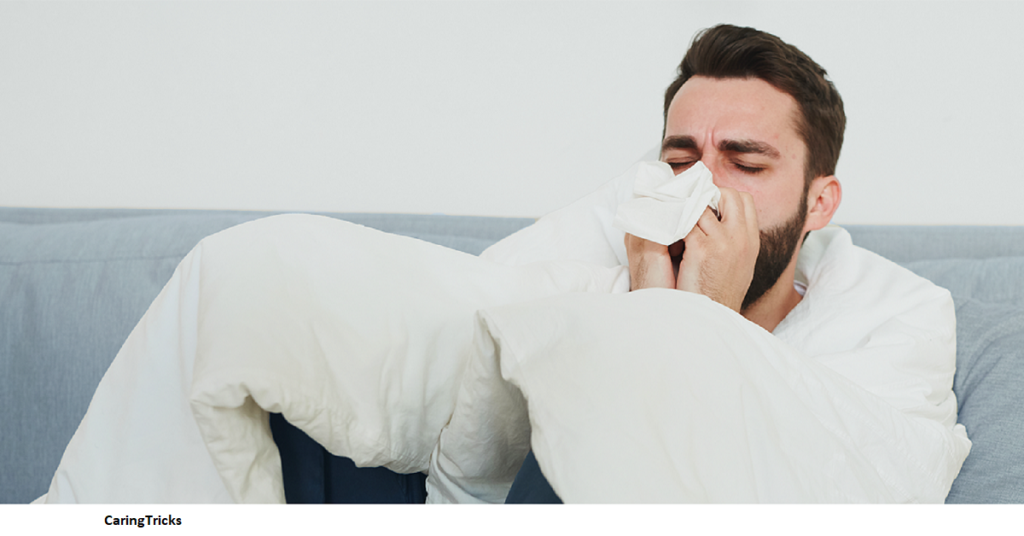How to Get Rid of a Common Cold?

The communicable disease is an aggressive contamination that influences the upper respiring area. The most frequent reason is a rhinovirus, and the most prevalent symptoms are a scratchy, painful throat, a stuffy or runny nose, and sneezing.
Colds and Flu:
Typically, cold symptoms are minimal. They are typically accompanied by sneezing, a runny or stuffy nose, and a scratchy throat. Even if there is a fever, it is not severe. There is no particular diagnostic procedure or remedy for the common cold. It only needs to finish its journey.
A virus (Influenza Virus):
The flu might also be a mild case. However, people with the flu typically feel worse if they have a cold. They might get a sudden temperature along with chills, a headache, and body pains. They can experience a runny nose, cough, and sore throat. Additionally, they have little appetite and typically feel uncomfortable and exhausted. Some youngsters might suffer tummy pain, nausea, vomiting, or diarrhea.
COVID-19:
People who have been exposed to the coronavirus may not show any symptoms at all or their symptoms may be minor, similar to a cold. Many people get milder flu-like symptoms. Therefore, COVID-19 symptoms might resemble cold or flu symptoms rather closely.
But they may also have various appearances. They could include various rashes or a loss of taste or smell, for instance.
Doctors can do a test that searches for a fragment of the coronavirus in the respiratory tract to determine whether a patient has been exposed to it. A blood test that searches for antibodies can also be used to seek for signs of a previous illness.
Common Cold Causes:
There are over 200 viruses that can cause a cold, but rhinoviruses are the most common. Through intimate physical contact and the air, they can transfer from individual humans to another. You may become infected if you make contact with something that has the viral infection on it and then touch your lips, nose, or eyes. For instance, you could catch a cold if you shake hands with someone who is contagious or if you touch your face after touching a doorknob contaminated with the illness.
What signs and symptoms indicate a common cold?
Common cold symptoms often include the following:
Common cold symptoms often show up one to three days after being exposed to a cold-causing virus. The following signs and symptoms, which might vary from person to person:
- Rhinorrhea or stuffy nose
- A throat aches
- Cough
- Congestion
- Minor headaches or body pains
- Sneezing
- Minimal fever
- Feeling generally ill
As a normal cold progresses, the drainage from nose may begin clear before becoming thicker, yellow, or green. Typically, this does not indicate that you are infected with germs. Usually, a few days after the virus has infected you, the symptoms appear. Certain symptoms may last for 10 to 14 days.
Diagnosis:
In overall, you do not really need to visit the physician for a regular cold. However, if your symptoms increase or do not go away, you should consult a doctor.
The signs and symptoms of the common cold may usually be used to make the diagnosis. To rule out other potential explanations of your symptoms, your doctor may request a chest X-ray or other testing if they have a suspicion that you have a bacterial infection or another ailment.
Treatment:
The common cold cannot be cured. Without medical intervention, the majority of instances of the common cold resolve within a week to 10 days. Antibiotics should not be used until there is a bacterial infection since they are useless against cold viruses.
Utilizing over-the-counter (OTC) medicine to lessen fever, body pains, congestion, and cough is one way to treat your symptoms. There are advantages and disadvantages to using over-the-counter painkillers, decongestants, nasal sprays, and cough syrups as traditional cold cures. Don’t administer over-the-counter medicines for colds.
Pain Relieving Drugs:
Adults frequently use over-the-counter acetaminophen (Tylenol) or other moderate pain medicines like ibuprofen for a fever, sore throat, and headache (Advil, Motrin IB, others).
Consider giving your kid baby or children’s over-the-counter painkillers like acetaminophen (Tylenol, among others) or ibuprofen to manage their temperature or pain (Advil, Motrin, others). These aspirin substitutes are safer.
Give acetaminophen to babies who are less than 3 months old only after they have seen a doctor. Ibuprofen should not be given to children under the age of six months, those who are continuously throwing up, or those who are dehydrated.
To prevent adverse effects, take these drugs for the least amount of time and according to the label.
Decongestants:
An antihistamine usually doesn’t help when allergies cause nasal congestion. A decongestant, however, could. Decongestants reduce blood vessels and tissue swelling. The congestion is reduced by that. Decongestants, however, are unable to relieve itching or sneezing. Decongestants come in the form of pills, fluids, nasal sprays, and drops.Many are offered over-the-counter. Typical decongestants consist of:
- Vicks Sinex, Dristan, and Afrin (oxymetazoline)
- Suphedrine PE and Sudafed PE (phenylephrine)
- Sudafed, Silfedrine, and Suphedrine (pseudoephedrine)
You can find certain over-the-counter decongestants, namely ones containing pseudoephedrine, behind the pharmacy counter.
Many medications, including Allegra-D, Claritin-D, Benadryl Allergy Plus Sinus, and Zyrtec-D, combine an antihistamine with a decongestant.
Use of decongestant nasal sprays shouldn’t go beyond three days. When you stop using them after a longer period of time, your nose may get more congested.
Home Treatments:
The common cold is treated with a variety of home remedies.
Honey:
Try honey, can be a popular treatment for cold symptoms, if your child is having difficulties sleeping well. A 2012 study Trusted Source found that giving youngsters a teaspoon of honey before bed can improve their sleep and lessen nighttime coughing. Additionally, it might ease sore throats.
Lots of Liquids:
When attempting to recover from a cold, it’s usually a good idea to drink enough fluids. Drinking tea, water, and chicken soup might help you keep hydrated, especially if you have a fever. They may also make it simpler for you to breathe by relieving chest and nasal congestion.
However, stay away from coffee and alcohol since they might dehydrate you and prevent you from getting the sleep and rest you require for recuperation.
Probiotic Beverages:
Despite the scarcity of data on probiotics and colds, after study (Trusted Source) claims that drinking a probiotic drink containing Lactobacillus, L. Casei 431, especially when respiratory symptoms are present, can decrease the duration of a cold.
Look at the label of the product you wish to buy to ascertain the probiotic bacteria it contains.
Vitamin C:
Taking a vitamin C pill is unlikely to stop a cold from happening. According to a 2013 review of research, frequent supplementation (between 1 and 2 grams per day) decreased the length of a cold in adults by 8% and in kids by 14%.
Vitamin C has a daily dietary recommendation of 90 milligrammes for males and 75 milligrammes for non-pregnant women. The danger of consuming greater dosages for any length of time exists when it exceeds the upper limit (2000 mg).
Zinc:
Almost three decades of research on colds and metallic mineral – zinc have proved antagonistic results, but a 2017 review of dossier by a believable beginning disclosed that metallic mineral lozenges can quicken improvement from a cold.The average duration of the cold was decreased by 33%, implying relief for at least a few days sooner.
However, according to the 2017 research, dosages of up to 150 mg of zinc per day are commonly given for months in some situations with little adverse effects. It should be noted that the doses used in this research, ranging from 80 to 92 mg per day, are much greater than the daily limit recommended by the National Institutes of Health.
Methods for Treating Cold Symptoms Include:
When your throat feels scratchy, your nose feels congested and runny, and you can’t stop sneezing, it’s challenging to concentrate on the activities you like. The following are some natural approaches to treat cold symptoms:
Meditate:
Eliminate stress because your body can devote effort to something keeping your invulnerable method forceful. Close your eyes and devote effort to something you break for several minutes each era to free stress and claim calm. Rinse with saltwater. To soothe a sore throat brought on by a cold, gargle with water containing salt.
Add Moisture to the Air:
Use a humidifier or cool mist vaporizer to replace liquid to the air in your bedroom as you sleep. Dry air may aggravate existing nose and throat problems.
Get Some Hot Air to Breathe:
Try a warm shower running the next period you have a cold that causes an oppressive nose. You may also breathe in vapor from a bowl of hot water. The mucus can become thinner by inhaling warm (not hot) steam, which can improve the way your mucus drains.
Consume Meals that will Help Your Immune System:
Foods high in vitamin C, such as citrus fruits like oranges, lemons, broccoli, red peppers, mangoes, strawberries, and other fruits and vegetables, can support your immune system and help you recover more quickly10.
Maintain Cleanliness:
Both treating your own symptoms and preventing the virus from infecting your friends and family are crucial. At home and at work, be careful to disinfect and sanitize surfaces that are regularly touched. When you or someone you know is sick, particularly during cold and flu season, be very careful to do this.
Consume a lot of Herbs, Spices, And Veggies:
Any therapy you use to treat a cold should focus on reducing inflammation. Eat lots of veggies, herbs, and spices. Red bell peppers and broccoli are two examples of veggies that can help your immune system.10 Some spices, such curry, garlic, and astragalus, are also recognized for reducing inflammation.
Consume Warm Drinks:
Although warm beverages are calming and comforting when you have a cold, fluids are still beneficial. By relaxing the irritated membranes that line your nose and throat, medicated hot liquids provide relief for your cough and sore throat symptoms.
Can you prevent the common cold?
The common cold cannot be prevented with a vaccination. However, you might be able to lower your risk of contracting or spreading a cold by:
Frequently wash your hands for slightly 20 seconds accompanying cleanser and water.
- Refrain from affecting your mouth, nose, or face with dirty hands.
- Avoiding direct contact, in the way of kissing, trembling hands, and giving drinks and consuming tools, accompanying the nation if you are gross or they are morbid.
- Scrubbing and sterilizing regularly touched surfaces.
- Using tissues to cover sneezes and coughs. After that, discard the tissue and clean your hands.
- Remaining at home while ill.
What distinguishes a cold from the flu?
Colds and influenza (flu) are both infectious respiratory infections, although they are brought on by different viruses. The communicable disease may be provoked by an assortment of viruses, that is to say rhinoviruses, parainfluenza, and influenza viruses, but the infirmity is only provoked by influenza viruses. The bug that causes COVID-19, SARS-CoV-2, bears no misunderstanding accompanying seasonal coronaviruses. Because the manifestations of the infirmity and the communicable disease are complementary, it may be disputing to equate them based just on syndromes. Flu manifestations are commonly more forceful than those of the common cold and generally start quickly. Flu is usually more harsh than a cold. Those who have colds are more prone than those who have the flu to have runny or stuffy noses. In most cases, colds do not lead to major medical issues including pneumonia, bacterial infections, or hospitalizations.
When to Contact a Physician?
First, attempt home remedies for your cold. If you have: Dial your provider straight away, or get to the emergency room:
- Trouble breathing
- Acute abdominal or chest pain
- Acute queasiness
- Behaving oddly
- Excessive vomiting that doesn’t stop
Call your supplier as well if
- Your behavior changes.
- After seven to ten days, your syndromes either decay or don’t recover.






